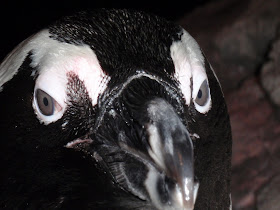
No goggles needed for this African penguin.


But people? Goggles or a dive mask come in handy for seeing underwater.
Photo on left via Wikimedia Commons, photo on right is a diver in the GOT
Penguins are visual ocean hunters so they need to be able to see well underwater in order to catch fish and avoid predators. But they also need to see well on land so that they can find proper breeding sites and protect and care for their eggs and young. If a penguins' eyes could focus only in air then they would be at a disadvantage when in the water, and vice versa.
Penguins have evolved a flattened cornea which refracts light less strongly then ours and strong eye muscles that can change the shape of the lens allowing for sharper vision underwater. These adaptations allow focus in air and in water!!!

This rockhopper penguin can see well underwater and on land!
In addition, penguins have a clear eyelid called a nictitating membrane that protects their eyes when underwater.
These adaptations eliminate the need for penguins to pack goggles whenever they go to the beach.
Penguins have evolved many other amazing adaptations. The Penguin Blog is the place to learn about penguin ears and penguin knees. You can even see what scientists think prehistoric penguins looked like!
Wow, I never really thought about that before. Neat post (and nice selection of pictures to boot)!
ReplyDeleteGreat information transfer.
ReplyDeleteIs there any chance of doing a penguin encounter/experience at the Boston aquarium? It's my dream to feed one or pet one!
ReplyDeleteHow long can a penguin stay under water.
ReplyDelete